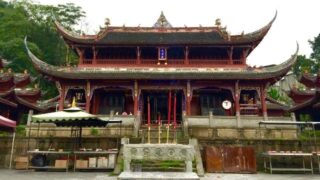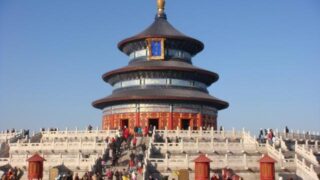Scholars believe a sage called Kongzi (Confucius) did exist between the 6th and the 5th century BCE. He was a traditionalist who tried to restore the way of the ancient scholars.
by Massimo Introvigne.
Article 2 of 5. Read article 1.


Does Confucianism exist? The question is not pedantic, even if there are entire libraries of books including “Confucianism” in their title. Like other terms, “Confucianism” was originally a piece of chinoiserie, a word invented by Westerners that Chinese had never used. Actually, the process was twofold, and involved an ecumenical cooperation of sort between Catholics and Protestants.
First, Catholics invented the word “Confucius.” Before the 17th century, nobody had heard of Confucius, although everybody in China and some outside the country knew the name of an early Chinese sage called Kong. He was referred to in China with the honorific titles of Kongzi (Master Kong) and Fuzi (The Master). As Lionel M. Jensen has argued in “Manufacturing Confucianism: Chinese Traditions and Universal Civilization” (Durham, NC: Duke University Press, 1998), “Kongfuzi,” a word putting together “Kongzi” and “Fuzi” was very rare in written Chinese, but was used in the spoken language. Jesuit missionaries heard it, and Latinized it into “Confucius.”


Yet, “Confucianism” was rarely, if ever, used until Protestant missionaries started being interested in Confucius. It was the Scottish missionary James Legge (1815–1897) who perhaps created and certainly popularized the word “Confucianism.” Actually, Legge did much more. He became the first professor of Chinese at Oxford University, and a friend of German philologist Max Müller (1823–1900). When Müller published his monumental 50-volume collection “Sacred Books of the East,” four volumes on Confucianism, edited by Legge, were included. From then on, that Confucianism was one of the world’s great religions became a matter of course, and “Confucian” representatives, in fact officers of the Qing imperial court, were invited to the first Parliament of the World’s Religions organized in Chicago in 1893.
This is not to say that Chinese resisted the use of “Confucius” and “Confucianism.” On the contrary, they embraced the terms quite enthusiastically, and ended up forgetting these words had been invented by Western Christians. Today, the cultural institutes and international propaganda outlets of the People’s Republic of China are called “Confucius Institutes,” and “Confucius” and “Confucianism” pop up everywhere, including in speeches by Xi Jinping.
However, even official translations of Chinese documents translate with “Confucianism” two different Chinese expressions, “Kongjiao” (孔教), the “teachings [or religion] of Confucius” and “Rujia” (儒家), the “Way of the Ru” (we will try to define “Ru” later; and there is also “Rujiao,” the “teachings [or religion] of the Ru”). “Kongjiao” was introduced in the Chinese language in the 19th century to translate the Western word “Confucianism.” Although it is promoted today, as we will see in another article of this series, by those who would like to see Confucianism officially recognized as a religion, “ Rujia” remains the most common expression.
The astute reader would have noticed that Confucius or Master Kong is nowhere to be seen in “Rujia.” This explains a curious incident reported by Tony Swain at the beginning of his book “Confucianism in China.” When visiting Qufu, in Shandong province, the hometown of Confucius and for this reason a popular tourist destination, Swain was given a bilingual tourist brochure. In the English version, it was explained that “Confucius was taught Confucianism” as a young man. It did not make sense, and nobody would say that Jesus Christ was taught Christianity (by whom?) at an early age. However, the word translated as “Confucianism” in the brochure was “Rujia,” not “Kongjiao.”
Was he alive, Confucius would probably abhor the world “Kongjiao” but would wholeheartedly agree that he was trained in “Rujia” by good masters. In fact, as far as we know, Confucius always insisted that he did not invent or create any new doctrine. In the previous article, I have mentioned Father Joseph Shih, the Jesuit scholar who introduced me to Confucius some fifty years ago. He started his courses by explaining that Western Enlightenment philosophers had turned Confucius into a subversive, whose aim was to get rid of the old Chinese religion. In fact, Confucius was a traditionalist. He believed that China, at his time in a deep cultural and political crisis, had once been great; it had forgotten its past greatness and badly needed to return to its ancient ways.


Confucius (551–479 BCE, if we believe the traditional dates) lived under the Western Zhou dynasty (1050–256 BCE), at a time of political crises and revolts, which led to the Warring States period (475–221 BCE) a few years after the sage’s death. Confucius looked with nostalgia at the early Zhou years around 1000 BCE, when King Wu ruled assisted by his younger brother, the Duke of Zhou. The learned Duke is credited with having created the doctrine of the Mandate of Heaven, according to which Heaven gives, and may withdraw, its mandate to rule to subsequent Chinese dynasties.
While the Duke had to fight those who wanted to restore the ousted Shang dynasty (1600–1046 BCE), Confucius believed that there was a lot to be praised among the Shang too, as well as among their predecessors, the Xia. The sage was a true believer in the mythical history of China, and was not bothered by theories by later scholars that many of the characters he referred to likely never existed.
The Xia, Shang, and early Zhou kingdoms had been great and prosperous, Confucius argued, because they promoted culture and morality and honored the sages. He came, in his own words, “to transmit, not to innovate,” and to restore the real or supposed wisdom prevailing at the times of the Duke of Zhou, which he believed dated back to much early ages. Here we encounter again “Rujia,” one of the terms translated today as “Confucianism.” Confucius wanted to restore the wisdom of the Ru, but who were the Ru? The term is often translated as “scholars,” but in fact indicated a class of scholars who had mastered certain texts referred as “Classics” and supposedly dating back to the early Zhou years if not before.
These were at the time of Confucius, or shortly thereafter, the “Five Classics,” i.e., the Classic of Poetry, the Book of Documents, the Book of Rites, the “I Ching” (Book of Changes, also used for divination), and the historical Spring and Autumn Annals. The Annals, a compilation of historical facts, cover a period until Confucius’ last years, and were allegedly added to the Classics by him, although they were probably written later and supplemented by commentaries, including the esoteric “Gongyang,” which became among certain scholars more important than the text itself. It is also said that Confucius added parts to the Book of Rites and appendixes to the I Ching. Later, many additional Classics were added, including the Analects, a collection of sayings by Confucius written after his death, probably in layers during the course of three or more centuries.


There are problems with Confucius similar to those Christians have with Jesus. There is evidence enough to persuade scholars that Confucius existed, but most of the biographical details about him were written down centuries after his death. What is probably accurate is that he was born in the state of Lu, in present-day Shandong province, in an aristocratic family that had lost its status and was regarded as “semi-aristocratic” only. He trained as a scholar and obtained administrative positions in his home state, including commissioner of police. Both hoping to spread his program of restoring the glory of the Ru and escaping political instability, he traveled around China. He did not have much success, though, and returned home to spend his last years in teaching a small number of selected disciples.
Confucius did not want to be called “master” or even “sage,” and he claimed he just wanted to teach the old Ru ways. At the same time, if we believe the Analects, he repeatedly said he was acting on behalf of “Heaven” (Tian). But what was “Heaven” for Confucius, exactly? We will address this question in the next article of the series.









